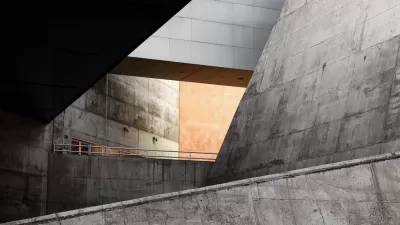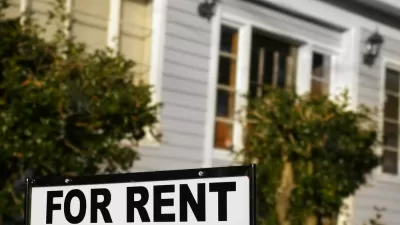The FBI may get the new building it's been clamoring for, and developers may get a prime opportunity on D.C.'s most prestigious avenue, if a recent proposal by the GSA comes to pass. But what will happen to one of the city's last Brutalist buildings?
We heard recently that D.C.'s preservation community was turning a cold shoulder to the plight of one of the city's last examples of Brutalist architecture. The proposal made public this week by the General Services Administration to "[hand] the Hoover building to private developers in exchange for building the FBI a new headquarters campus elsewhere in the region" is raising urgent questions about the fate of the "ugliest building on Earth" and a race among local officials to land the new FBI campus.
The announcement of the proposed trade by GSA Acting Administrator Dan Tangherlini on Monday, "immediately kick-started a competition among local jurisdictions to win a federal campus that would bring as many as 11,000 FBI headquarters jobs," writes Jonathan O'Connell. "Local members of Congress sounded like real estate brokers as they pitched sites and talked up their jurisdictions."
"While the FBI voiced its displeasure about the [Hoover] building in recent years, a snazzy new downtown neighborhood grew up around it, one featuring retailers H&M, Anthropologie and shops selling frozen yogurt and gourmet sandwiches."
"The apartments and restaurants make the concrete mass of the government building appear more dated than ever. Its sidewalks, devoid of cafes and patrolled by FBI authorities on Segways, seems to belong to a time when downtown D.C. emptied at 5 p.m. Even top historic preservation officials in the city consider the building not worth what would probably be a very public, bitter fight to try to save it," adds O'Connell.
Officials hope the sale of the building will pay for the cost of constructing a new FBI campus.
FULL STORY: GSA proposes trading Hoover building for new FBI campus

Maui's Vacation Rental Debate Turns Ugly
Verbal attacks, misinformation campaigns and fistfights plague a high-stakes debate to convert thousands of vacation rentals into long-term housing.

Planetizen Federal Action Tracker
A weekly monitor of how Trump’s orders and actions are impacting planners and planning in America.

San Francisco Suspends Traffic Calming Amidst Record Deaths
Citing “a challenging fiscal landscape,” the city will cease the program on the heels of 42 traffic deaths, including 24 pedestrians.

Defunct Pittsburgh Power Plant to Become Residential Tower
A decommissioned steam heat plant will be redeveloped into almost 100 affordable housing units.

Trump Prompts Restructuring of Transportation Research Board in “Unprecedented Overreach”
The TRB has eliminated more than half of its committees including those focused on climate, equity, and cities.

Amtrak Rolls Out New Orleans to Alabama “Mardi Gras” Train
The new service will operate morning and evening departures between Mobile and New Orleans.
Urban Design for Planners 1: Software Tools
This six-course series explores essential urban design concepts using open source software and equips planners with the tools they need to participate fully in the urban design process.
Planning for Universal Design
Learn the tools for implementing Universal Design in planning regulations.
Heyer Gruel & Associates PA
JM Goldson LLC
Custer County Colorado
City of Camden Redevelopment Agency
City of Astoria
Transportation Research & Education Center (TREC) at Portland State University
Jefferson Parish Government
Camden Redevelopment Agency
City of Claremont




























